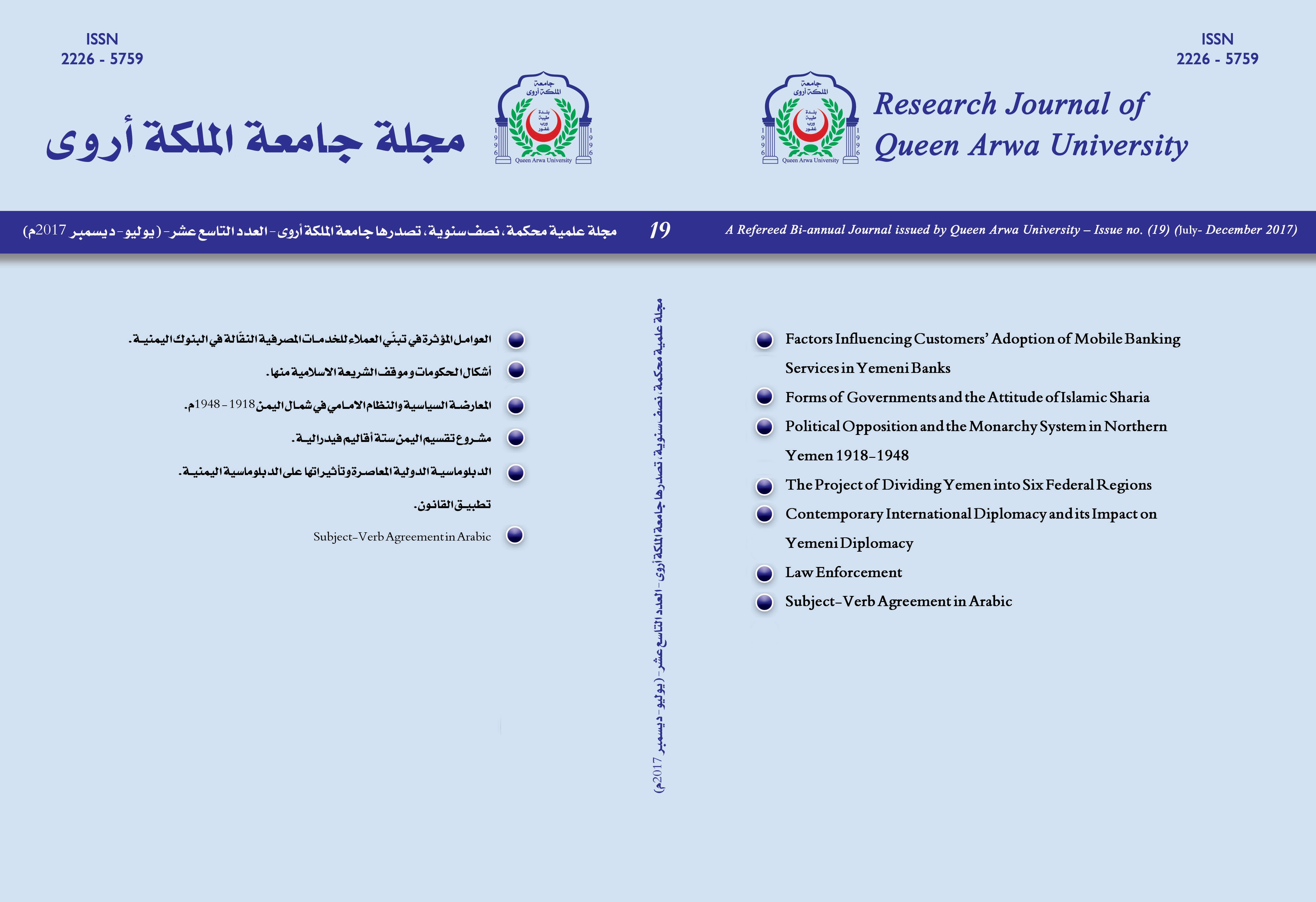Subject-verb agreement in Arabic
DOI:
https://doi.org/10.58963/qausrj.v19i19.232Keywords:
Subject-Verb Agreement , Modern Standard Arabic (MSA) , Simplified SystemAbstract
Agreement in grammar refers to formal relationship between elements, whereby a form of one word conforms to the form of another. The preservation of agreement between a controlling phrase and a controlled phrase under various conditions provides a clear indication that agreement relations are sensitive to linear or directional properties, otherwise, we would expect agreement to be affected by word order changes.
In this paper I shall work on subject-verb agreement in Modern Standard Arabic (MSA) whose rich inflectional agreement system is fascinating. I intend to examine its rich agreement patterns in the minimalist framework and find out the structural mechanism of the assignment system followed by a detailed study of the three phi- features in Arabic, i.e. person, number, and gender.
This paper will address the following issues of subject-verb agreement in Arabic: a) why the verb in VSO order does not show the person and number agreement and only shows gender agreement with the post-verbal subject and b) the ambiguity of the first person in Arabic that is unspecified.
Downloads
References
Al-Jarim, A. 1953. “Aljumla Al-fi؟liyya Asa:s Al-ta؟bi:r fi Al-ugha Al-؟arabiyya” (The verbal Sentence is the basis for expression in Arabic). mjallat Majma؟ Al-lugha al-؟arabiyya. Matba؟at Wizarat Al-Ma؟rif Al-؟umu:miyya, Egypt. pp.347-350.
Atef, M.M. 1992. The Case theory and Arabic Prepositions. Ph.D. Thesis, Delhi: University of Delhi.
Aoun etal.1994. “Agreement and Conjunction in some Varieties of Arabic” Linguistic Inquiry, 25, 195-200.
Benmamoun, E.1993. “Agreement and the Agreement Projection in Arabic”. In Studies in the Linguistic Sciences, 3, 61-71. Urbana: University of Illinois.
Benmamoun, E. 1997. “Agreement, in Arabic and the PF Interface”. In Brian, A. and Size-wing, T. Proceedings of WCCFL. XV, 33-46.
Benmamoun, E. 2000. Feature Structure of Functional Categories. A Comparative Study of Arabic Dialects. New York Oxford: Oxford University Press.
Chomsky, N. 1986b. Generative Grammar, Studies in English Linguistics and Literature. Kyoto University of Foreign Studies.
Chomsky, N. 1991. “Some notes on Economy of Derivation and Representation.” In Principles and Parameters in Comparative Grammar, ed. by Robert Freidin Cambridge, MA: MIT Press. 417-454.
Chomsky, N. 1995. The Minimalist Program. Cambridge, MA: MIT Press.
Crystal, D.1995. A Dictionary of Linguistics and Phonetics. Cambridge: Carbide University Press.
Fassi, Fehri, A. 1989. “Agreement in Arabic, Binding and Coherence”. In Agreement in Natural Languages: Approaches, theories, Description. Barlow, M. and Ferguson, C. (eds.) Standard, CA: CSLI. 107-158.
Ferguson, C.A. 1997. “Grammatical Agreement in Classical Arabic and the Modern Dialects”. In Structure Studies in Arabic Linguistics. Kirk, B. and Niloofar, H.(eds.), Leeden: Bill. 81-93.
Givon, T. 1976. “Topic, Pronoun and Grammatical Agreement”. In Subject and Topic. Li, C.N. (ed). New York: Academic press. pp. 151-88.
Haegeman, L.1995. Introduction to Government and Binding Theory. Oxford: Blackwell.
Hassan, A.1987. Al-Nahwa Al-wfi (The Complete Grammar). Cairo:Daar Al-Ma؟aarif.
Ibn Aqil. 1979. Shar Ibn Aqil (Ibn Aqil’s Explanation). Vol. II. Beirut: Daar Al-firk.
Ibn Hisham.1981. Shudur Adahab fi Ma؟rifat Kalam al-؟arab. Beirut: Daar Al-Fikr.
Ibn Ma:lik. 1986. Awdah Al-Masalik (The Clearest Paths). VOl. II, Beirut: Daar Iiya Al-Tura Al-؟arabi.
Johannessen, J.B. 1996. “Partial Agreement and Coordination”. Linguistic Inquiry 27, 4, 661-676.
Koopman, H. 1987. on the absence of Case chains and Bambara.” MS., UCLA Lapointe, S.G.1988. “Towards a Unified Theory of Agreement.” In Barlow, M. and Ferguson, C. A. (eds.) Standard CA: CSLI.
Lehmann, C. 1982. “Universals and Typological Aspects of Agreements”. In Seiler, H.H. and Stachowiak, F. (eds.) 195-240. Apprehension Tubingen: Narr.
Mace, J. 1996. Arabic Today. Edinburgh: Edinburgh University Press.
Nicholas, S.1997. “Agreement, Default Rules and Grammatical Viruses: Linguistics Inquiry. 23,318-343.
Owns, J. 1988. The Foundation of Grammar. An Introduction to Medieval Arabic Grammatical Theory. Amsterdam: John Benjamins.
Ouhalla, J. 1991. Functional Categories and Parametric Variations. London: Routledge.
Quirk et al. 1985. A Comprehensive Grammar of the English Language. London: Longman.
Sibawaih (1317 A.H.) Al-Kitaab. Vol. 2. Cairo.
Thacher, G.W. 1981. Arabic Grammar. Delhi: Asian Publication Services.
Versteegh, K.1997. The Arabic Language. Edinburgh: Edinburgh University Press.
Wright, W.. 1896. A Grammar of the Arabic Language. Vol. 1. Cambridge: Cambridge University Press.
Downloads
Published
Issue
Section
Categories
License
Copyright (c) 2017 by the Author(s) mentioned in this article.

This work is licensed under a Creative Commons Attribution 4.0 International License.













